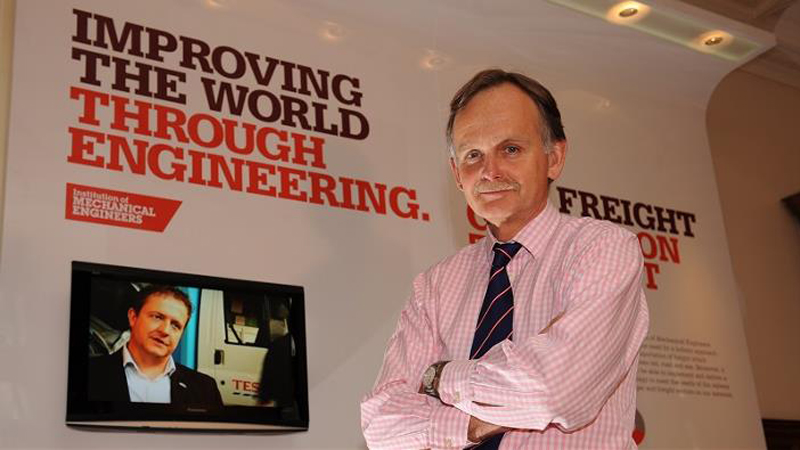When you are a barrister and high up in the ranks, you may get a reputable 'QC' moniker. When you say that you're an architect, no one will mess with your title (in a good way), but people will instantly think of, say, the Sydney Opera House.
But if you introduce yourself as an engineer, then – say engineers – chances are that you will struggle to gain respect, at least in the UK. "We all joke about the engineer who can fix a car, but the stereotype is true, sadly," says Tony Gray, a Chief Engineer in the UK industry (who asked not to mention his place of work).
Carolyn Griffiths, the UK’s former chief inspector for the Rail Accident Investigation Branch, and the new President of the Institution of Mechanical Engineers (IMechE), echoes that view. "If you present children with some interesting problems and how they are being resolved, the impact it will have on society and on individuals, and you don’t mention the engineering word, I bet you they will be fascinated," she says. But do say the E-word, and the engineering stereotypes will raise their ugly heads – "it’s boring, it's not interesting, it’s about machines, isn’t it?’" she adds. "We are up against some very long-standing stereotypes about what our profession is about."
So what can be done to make engineering more appealing to the general public - and specifically to kids, the next generation of inventors and problem-solvers? Gray says the number one thing to do is to make the term ‘engineering’ and ‘engineer’ carry kudos, professional weight, and societal recognition. "The term ‘engineer’ needs to be ‘cool’ in the eyes of the young," he says.
Engineer v mechanic
It took Gray seven years to qualify as an engineer post A levels - yet, he stresses, he would not call himself an engineer when meeting a stranger "because I know that they will associate me with fixing cars, washing machines, central heating boilers and so on," he says.
Unlike in many other countries, in the UK engineering is not a licensed profession - and indeed, the term 'engineer' can be and often is used by people without a formal university engineering degree, for example by technicians, technologists, mechanics, plumbers, electricians, draftsmen, machinists, repair people, and so on. "Anyone can describe themselves as an engineer and whether they have any qualifications at all is irrelevant," says Gray. "I recently saw a van with a logo showing that the owner was in the wooden floor laying business and was a ‘flooring engineer’!"
 In the UK, any technician can call himself/herself an engineer as the title isn't protected (Credit: iStock)
In the UK, any technician can call himself/herself an engineer as the title isn't protected (Credit: iStock)
For the public, it then becomes tricky to understand what engineering is - and many may interpret is as a semi-skilled trade. "The main problem is that the use of the term engineer in the English language is so embedded both as a verb, an adverb and a noun, that it would be very difficult to start restricting its use," says chief executive of IMechE Stephen Tetlow.
Alfred Reading, a retired mechanical and electrical engineer from Surrey and former Engineering Adviser to the National Gallery, says that the number one problem stems from "the engineer v mechanic confusion, which the Institutions have failed to correct in over half a century. Perhaps a requirement to use Eng. for those qualified - as for Dr. - would be a start."
One of the engineers Gray mentors recently asked the IMechE, during a visit, what the Institution is doing about the issue. It is, argues Gray, "a frustration to the quiet majority of graduates" he works with. "The reply was that the aim is to protect the term ‘Chartered Engineer’ but not the word ‘engineer,’ which my colleagues and I find most unsatisfactory. This is because it still allows the non-qualified to use the term ‘engineer,’ plus Chartered Engineer does not carry any kudos outside the profession, as the layman will only hear the word engineer - 'the car repair person'."
Words 'do matter'
Elsewhere, the situation is different. In the US, for instance, each state governs the registration of professional engineers - meaning that each license is only valid in the state where it is granted. In Canada, engineering is protected by law, making it illegal to practise engineering or even to use the title "engineer" without a license. However, professional engineers in Canada are not licensed in one specific discipline - rather, they are bound by their respective provincial code of ethics. The title 'engineer' is also protected by law in a number of other countries, such as Chile, Turkey and Brazil. In Germany, engineers with an academic education receive a title Dipl.-Ing. (Diplom-Ingenieur, diploma engineer) - however, this is not a license to practise engineering, but more of an academic title.
Tetlow thinks that "as far as pre-nominals are concerned, it’s a great idea. But I doubt it would stick, and there does not seem to be much of an appetite for it, as much as there isn’t a great appetite for the existing pre-title of EurIng."
But Gray suggests that the professional institutes need to "accept that words do matter" and develop a strategy to protect the title 'engineer'. However, in the wider scheme of things, it may all be down to legislation to bring about change, he adds, to get more young people to aspire to engineering.
 IMechE CEO Stephen Tetlow isn't convinced that a 'protected' title will stick (Credit: IMechE)
IMechE CEO Stephen Tetlow isn't convinced that a 'protected' title will stick (Credit: IMechE)
Peter Finegold, IMechE Head of Education, disagrees. "If the term ‘engineer’ is somehow protected (and I can’t see how that could easily be done)," he says, "what then happens to the status of Chartered Engineer?"
"There is a public perception issue about the nature of engineering – what it actually is – but I don’t believe protecting the name will do much to challenge this. The work we’ve done on trying to re-frame engineering in the school experience of young people focuses more on engineering as ‘a creative and intelligent process’ and less on engineering as ‘a job’ or ‘a collection of technologies’," says Finegold. There should be "more meaningful and managed engagement with the way in which engineering improves people’s lives."
Make it cool
Tetlow thinks that engineers need to "shout more about what they do and say more about the amazing and vital contribution we make to all aspects of modern society and our world". One way to achieve that, he adds, is for institutions to continue to run campaigns on issues like food waste, energy supply, clean air and autonomous transport - and do more to promote engineering in schools. "It is by putting our profession in the public consciousness that we achieve respect and, more importantly attract the young men and women we do badly need," he says.
One young person who doesn't need convincing that engineering is 'cool' is Juan Ferreira, a physics, maths and chemistry A-level student from Uxbridge, London. As a child, he was inspired by his father, a mechanical engineer, and Rodney from the movie Robots, he says.
"Unfortunately, when I gave myself a moment to think of other current figures of inspiration, I struggled in a way I wouldn't have if I was thinking about football," says Ferreira. "I have put this down to the way in which media don't really talk about the engineers as they do about celebrities and sport personalities."
He agrees that we need to start celebrating engineering heroes to inspire tomorrow's engineers - but he adds that we also have to start "showing young people the power of engineers in shaping our world for the better, using the sciences and maths.
"This is important as it will answer the question, 'why am I learning this?', which I have heard quite often during my time at secondary school. I hope that once this question is answered, it will motivate many more people to embrace maths and the sciences and so engineering."